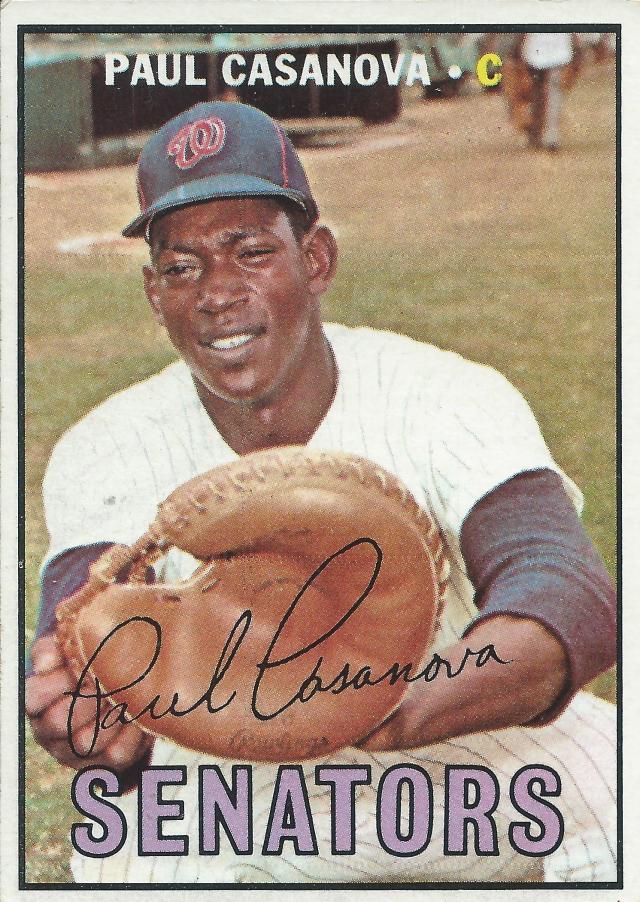By Jeff Stuart
In the June 13, 1967 edition of the Washington Star Morris Siegel reported that a fan from Silver Spring had called the Senators’ public relations department that morning. “Please, please tell her (his wife) the game went 22 innings and didn’t end until nearly 3:00 A.M,” he pleaded. When told it was true the woman snapped, “I don’t believe you or him. Seven hours for a baseball game? Moshe Dayan captured Egypt in less time.”
But it was true. When Paul Casanova drilled a ground single to left scoring Hank Allen at 2:43 A.M, 22 innings and six hours and thirty eight minutes after he had caught the first pitch, the Senators had a 6-5 victory over the first place White Sox in what was at the time the longest night game ever played in the major leagues. Whether or not the Silver Spring fan was among the 1500 or so of the official attendance of 7,236 who stayed to the end was not determined. “It is quite possible,” wrote Siegel, “that this was one of the first times in Washington , and one of the few occasions anywhere, that a baseball game was still going on after the bars had closed.” They stopped selling beer at the park at the stadium at 2 A.M. That complied with the Alcoholic Control Board ground rules for the city. Because of this game, the American League adopt a curfew – “no inning may start after 1 A.M.” This rule lasted for 33 years. The current Al curfew is 2 A.M. But it can be waived by the umpires if it involves a team’s last visit to a city.
“I not kidding you, I not even tired,” said Casanova who caught all 268 pitches. Cas threw out 4 base runners. He hit into a double play with the bases loaded and only one out in the 20th inning, before becoming the last of the Nats’ starters to get a hit with the walk off game winner. Manager Gil Hodges was asked if thought about replacing Cas with back up catcher Doug Camilli. “Not unless we went about another 8 innings,”Gil said. “Cazzy was just getting warmed up.”
Mike Epstein made his D.C. Stadium debut. He handled 34 chances at first base, 33 put outs and one assist, most for a first baseman in an extra-inning game. Right Fielder Cap Peterson had his first two homer night in the majors. He had 4 hits on the night, tops for both teams. Joe Coleman took a 4-1 lead into the 7th behind the home run bats of Peterson and Frank Howard. The Nats looked like the were going to deal Chicago’s Joe Horlen his first defeat of the year. But scored 3 in the 7th to tie the game and took a 5-4 lead in the top of the tenth. Washington tied the game in the bottom of the inning when a Jim King sacrifice fly scored Ken McMullen.
Darold Knowles pitched 5.1 innings of scoreless relief, Dave Baldwin, 3.2 and Bob Humphreys, the winning pitcher, 3 innings.
A week earlier, on Sunday, Juen 4, 1967, the Nats lost a 7-5 game to Baltimore in 19 innings.
On June 4, 1971, at RFK Stadium the Nats lost a 5-3 decision to the Oakland A’s in 21 innings, 5 hours and 19 minutes-the second longest game in American League history. In the top of the 21st Jim Shellenback walked Reggie Jackson with the bases loaded and wild pitched home another run. Shellenback was given a brief reprieve earlier in the inning when right fielder Larry Biittner threw out a runner at the plate for the second time during the game. Biittner also threw out Jackson at first after Reggie took too wide a turn a first after a single. The Senators made the final out at 1:06 A.M. Amazingly, about 4000 of the announced attendance of 6159 remained until the bitter end. The game was sent into extra innings by a two out two run single in the bottom of the 9th by Toby Harrah, who had 4 hits on the night. The Nats scored all three of their runs in that ninth inning. Frank Howard singled in the other run.
Oakland Starter Chuck Dobson carried a 3-0 lead into the 8th inning but after Casanova (who had 4 hits and again caught every pitch of yet another marathon game) and Howard singled leading off the inning, former Nats star, Knowles was called into pitch and quelled the threat by getting Don Wert to hit into a double play. But it was Knowles who ran into trouble in the 9th, yielding 2 of the 3 Washington runs. Paul Lindblad hurled 4 scoreless innings of relief for Washington, and Larry Riddleberger, 3.1.A’s Manager Dick Williams put the game under protest in the 14th, alleging that a fan interfered with his catcher on a foul pop. But the hitter, Harrah, popped out to the catcher anyway. Jerry Janeski was the starter for the Nats, allowing 3 runs in 6.1 innings.
There would be another 20 inning game in 1971. The game began in Cleveland on September 14. It was suspended after 15 innings. It was the second game of a twi-night doubleheader, and called at 1 A.M because of the curfew rule. Dick Billings tied the game at 5 with a 2 run homer in the top of the ninth. Shellenback pitched five scoreless innings. The game was resumed on September 20th in Washington prior to the regularly scheduled game. So the home team began the night as the visiting team. The Senators finally rallied for 3 runs in the top of the 20th. Denny McLain posted his 10th and final victory for Washington, hurling 4 innings. Cleveland scored a run in the bottom half of the 20th but the Nats won, 8-6. Harrah and Billings each had 3 hits for Washington.







